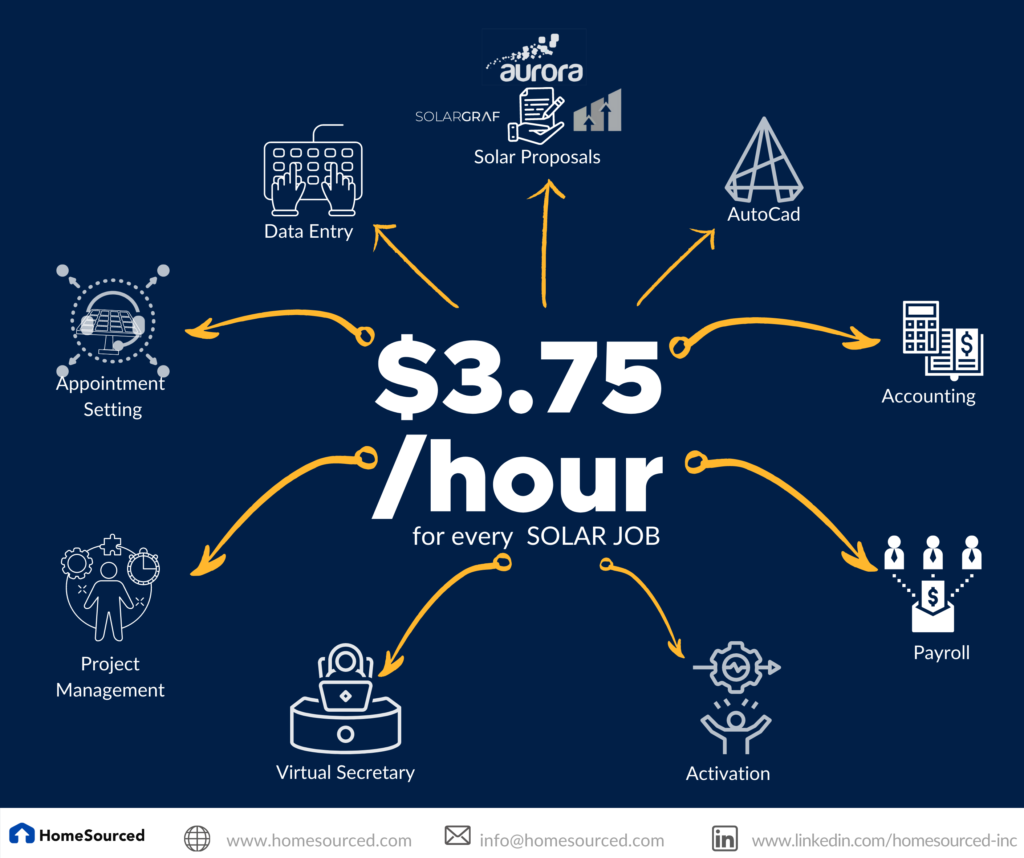In 2019, the global outsourcing market was already worth a whopping $92.5 billion. The worldwide IT outsourcing market, on the other hand, is expected to reach $397.6 billion in 2025. According to Aptude, about 300,000 jobs are outsourced every year in the US alone. A growing number of these come from solar companies.
Just last year, several residential solar firms started outsourcing their solar design jobs to independent contractors. They believed that outsourcing makes more sense for startups and small to medium-sized enterprises, especially in the wake of the coronavirus pandemic.
Now, if you are running a solar company and experiencing a steady increase in your overhead expenses amidst rising demand for your services, there might be no other way but to outsource. If you are seriously thinking about this move, then there might be some things you need to learn about outsourcing. And we are here to help you with that.
What is outsourcing?
Put simply, outsourcing is a practice wherein a business hires third-party contractors to take care of several business processes. This could be in operations, to accomplish tasks, or deliver services for them. For instance, you resort to outsourcing if you have tasks that cost too much time and money to handle in-house. By outsourcing, you hire people with specific skills sets to deliver the best output. Outsourcing is also advisable if there is a lack of business knowledge within your company. If you have staff working on areas outside of their expertise, then outsourcing is the best answer for you.
What benefits can solar companies gain from outsourcing?
Outsourcing has become a huge part in the operations for many companies– from small to medium-sized to large corporations. So, it is no surprise that solar companies are jumping into the bandwagon as well. Who would not want to outsource if it will cut down on overhead expenses and increase efficiency in the workflow? For example, if you could outsource solar jobs at $3.75 per hour, wouldn’t you grab the opportunity? It will save on costs and grow your business further as well!

See, that is what outsourcing can do for solar companies. Plus, it can also help improve your existing staff’s working conditions. They can finally do the jobs they were hired to do; and focus on the their BAUs, instead of devoting a substantial amount of their time to handle administrative functions. They can focus on the core business, thus eliminating the wastage of valuable resources. So, if you can outsource back-office functions, you will have a win-win situation in your hands.
What are the jobs that can be outsourced?
When outsourcing, it is important to determine the jobs in your company that can be handled by third-party contractors. This way, you will save on costs without compromising the quality of the delivery of your products or services.
Below are a few the most common jobs that are now being outsourced by solar companies:
1. Appointment Setting
This is the process wherein prospects are assigned to sales representatives. This way, closing reps will only spend time on leads who have already been qualified.
2. Dealer Onboarding
This is when new vendors are guided into your company’s network. Also known as vendor onboarding, this is first step in fostering a long-lasting relationship with clients, customers, and/or vendors.
3. Virtual Assistant (Secretary)
This role comes with such tasks as providing administrative services or supporting employers or clients. They coordinate calendars and schedules, answer emails, prepare letters, make travel arrangements, and organize files, among others.
4. Solar Proposals
This is the creation of white labeled solar proposals based on your needs using programs as Solorgraf, Aurora, and Sighten. Usually, the teams that will handle this will also help you set up request platforms from your domain email or from your own customer relationship management (CRM) system.
5. Sales Support
These are the people who handle the communication between the senior management and the sales teams. Aside from making sales and helping customers, they also handle clerical tasks like answering inbound calls and processing sales orders.
6. Customer Intake
This is the process wherein clients are introduced into your business and are provided everything they need for a successful outcome of their projects. This should include the welcome call (among the other phone calls), emails, in-person meetings, and some data entry tasks.
7. Project Management
This is where processes, skills, methods, experience, and knowledge are applied to achieve exact project goals that are based on the accepted project criteria, which were also reached based on parameters agreed by both a company and its client. Final deliverables for this role are usually constrained by a budget and a strict timeline.
8. AutoCAD Designs
This is getting designs done using the AutoCAD software. This software used by construction professionals is also used to create detailed 2D and 3D drawings for every project.
9. Data Entry for PTO, SREC, and other general operations
This is a general office job that requires standard office skills. This could be beneficial in handling employees’ paid time off (PTO) or dealing with Solar Renewable Energy Certificates (SREC), among others.
10. Accounting, including True-up
This could mean all or just several accounting needs of a company like invoices, receivables, bookkeeping, and payroll. You could also get a more specialized service like having a true-up done. This is basically the reconciling, matching, or the tying-out of two or more balances with the aid of an adjustment.
11. Account Management
This is essentially about monitoring and managing the percentage-of-completion or PoC of long-term contracts, which is a usual method used by companies to establish their revenues.
12. Graphic Design
This role includes the research of market needs and trends to better know what gets the audience’s attention. This includes meeting with clients to discuss layouts and designs. Designers often use different designing software to provide logos, graphics, images, and website designs, among others.
13. Video Editing
As the name suggests, this job entails multimedia specialists work. We edit raw video files to create something more interesting and fitting to present anywhere.
14. Website Development
This is the process of building and maintaining a website using a platform of the client’s choice. This is essentially the behind-the-scenes work that’s done to make a website attractive to its visitors.
15. Automation Development for CRM Maintenance
If you are looking for a way to automate the maintenance of CRM systems, we got your back! There are now specialists who develop CRM Automation software that can help streamline workflows and improve productivity. This is done by targeting key areas like customer service, sales force, and marketing.
16. Tech Support
This role is meant for overseeing and maintaining software systems and computer hardware. Its duties include assisting in the resolution of technical issues that may arise with a client’s account. We also address problems with the software infrastructure of a company.
17. Customer Service
Essentially, this is the support you can offer to your customers. It is what your team does to aid customers helping them use or optimize or a product or service. This service also includes troubleshooting.
The jobs mentioned above are just several of the many being outsourced right now by solar companies. If you are on the fence about tapping an outsourcing company, fret not. If you don’t know where to start, then this article might help. Make the move and start to save on costs and grow your company according to your goals.





Leave a Comment